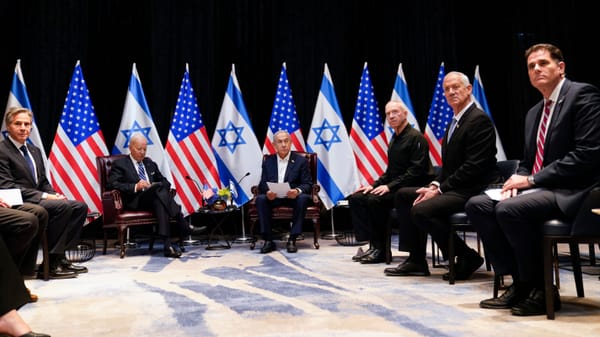America’s misbegotten post-9/11 wars sowed profound doubts about US foreign policy, drawing opposition, first, from the antiwar left and, later, the populist right. This occurred for good reason. The Bush administration framed these adventures in terms of grand ideological crusades, rather than narrow national interests. The wars ended up destabilizing the Mideast societies they were supposed to benefit, while curtailing civil liberties at home.
“Critics of US foreign policy have taken a gravely wrong turn.”
Despite sharing much of this skepticism, we believe that critics of US foreign policy have taken a gravely wrong turn. Too often, fitting mistrust toward the claims of America and its allies is accompanied by a profound credulity toward those of foreign rivals and adversaries. Likewise, an admirable willingness to criticize the misdeeds of American power frequently goes hand-in-hand with a blithe acceptance of the misconduct of America’s enemies.
One could see this clearly in the response to the explosion at the Al-Ahli Hospital on the Gaza Strip. Politicians and pundits who minutely scrutinize the statements of Western democracies immediately accepted the claims by the Hamas-controlled Gaza Health Ministry that more than 500 innocents had been killed by an Israeli bomb. The best available evidence suggests that the hospital itself is intact, and that the death toll was far lower; while further investigation is needed, it is far from clear that the blast was caused by the Israeli Defense Forces.
But in the heat of the moment, the facts didn’t matter. Rep. Rashida Tlaib (D-Mich.) tweeted, “Israel just bombed the Baptist Hospital killing 500 Palestinians (doctors, children, patients) just like that.” Rep. Ilhan Omar (D-Minn.) declared, “Bombing a hospital is among the gravest of war crimes. The IDF reportedly blowing up one of the few places the injured and wounded can seek medical treatment and shelter during a war is horrific.”
On the right, meanwhile, this tendency increasingly manifests itself as a conspiratorial belief that the Washington elite’s malign designs are the sole and secret motor of world history. In an interview with Tucker Carlson, Vivek Ramaswamy implied that the Biden administration was to blame for Hamas’s terror assault. Referring to Team Biden’s offer of a defense pact and nuclear development to Saudi Arabia in exchange for normalization with Israel, the GOP presidential contender said, “We can’t just dismiss the possibility that these two things”—the proposed deal with Riyadh and the Hamas attack—“are entirely unrelated [sic]. I mean, right when we have inserted our noses in . . . what do you get two months later? This disastrous attack.”
Whatever one makes of the proposals to the House of Saud—we oppose them—the fact is that a highly coordinated assault like the one that unfolded on Oct. 7 in Israel would have taken months of planning, as _The New York Times _and other outlets have indeed reported. More to the point, attitudes like Ramaswamy’s represent a kind of “inverted exceptionalism,” as the progressive scholar Djene Rhys Bajalan has recently argued. Instead of seeing America as the sole force for good on the world stage, inverted exceptionalism blames the nation for every foreign crisis, no matter what the real causes happen to be. It exaggerates American guilt while minimizing others’ agency.
Whatever this is, it isn’t hard-headed realism. If it was wrong to imagine that the United States was always and everywhere the bringer of freedom and democracy, it is equally deluded to suppose that America’s enemies stand on the side of truth and light—or that everything the likes of Hamas do stems from plots hatched in Washington.
At this moment, realism means recognizing that Israel has a right and a duty to defend its people. The Israeli government has stated that it won’t ask for any US troops to join in the fighting, and that is appropriate. The Biden administration should also be commended for offering other forms of backing to Israel as it prosecutes this war, including intelligence and arms, even as it works behind the scenes to prevent the Gaza crisis from spiraling into a potentially catastrophic regional confrontation. Humanitarian aid to Gaza must be permitted, and Palestinians’ legitimate political aspirations mustn’t be allowed to fall by the wayside.
Critics of US foreign policy have rightly highlighted the danger of a rush to judgment and the curtailment of dissenting views. Americans should oppose calls for social-media censorship in the name of combatting “disinformation,” and welcome critical voices even when we believe their conclusions are profoundly wrong. The crackdowns against campus critics of the Jewish state, however misguided their views or outrageous some of their rhetoric, risks strengthening the apparatus of soft repression that too often confronts dissidents of all stripes.
In the wake of the War on Terror, many Americans became increasingly wary of our foreign-policy elites. But this salutary wariness should be upheld evenly and prudently, with due skepticism brought to bear on the claims of the likes of Russia, China, and Iran, as well as those of the US government. America isn’t the savior of the world, as some foreign-policy hawks fervently believe. But nor should Washington be blamed for everything that goes wrong in the world, as some of its critics have begun to do.
